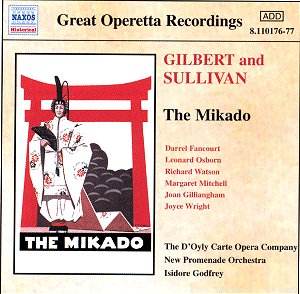 |
GILBERT AND SULLIVAN ON NAXOS The Mikado Pooh-Bah - Richard Watson; Pish-Tush - Alan Styler; Yum-Yum - Margaret Mitchell; Pitti-Sing - Joan Gillingham; Peep-Bo - Joyce Wright; Katisha - Ella Halman D'Oyly Carte Opera Company, New Promenade Orchestra c. Isadore Godfrey recorded Decca, London 1950 Crotchet AmazonUK AmazonUS Amazon recommendations |
Like many another, I first got to know this pair in their middle-aged Decca Ace of Clubs LP period, and though I looked forward to resuming the acquaintance, it was with the keen trepidation we reserve for old friends unseen for decades. In the event, whilst the 1950 D'Oyly Carte "The Mikado" has not worn well - even in the dusk with a light behind it - the 1948 "H.M.S Pinafore" strides forth as manfully as ever.
What is wrong with this "Mikado"? Plenty, starting with the conductor. "The Mikado" must rise like a light soufflé, but Godfrey jogs through it at a uniformly cosy trot. How dispiriting to hear the delectable quartet "So please you sir we much regret", as perfect a number as Sullivan ever wrote, launched at exactly the same comfortable tempo as the preceding "Three little maids". Granted, allowance should be made for the piecemeal nature of a recording originally made for 78 sides, but there's little brio about proceedings and no lightness of touch. The dull, muddied recording does nothing to raise it.
And then we have some much-admired performers. It pains me to report that few of them at this distance rise above repertory routine. Richard Watson's Pooh-Bah is sub-fusc, unwieldy and unsteady throughout. Darrell Fancourt's Mikado was equally past its sell-by date by 1950, despite the famous indrawn banshee-scream of a laugh. Leonard Osborn was loved for his personality on stage and off, but his nasal tenor rarely sounds competent on record and this is not one of those occasions. Margaret Mitchell's Yum Yum is crippled by 'D'Oyly Carte diction' and pert tone. Ella Halman improves matters with a classic Katisha, throwing herself at the part with the outrageous relish of a Japanese Clara Butt; and marooned in the middle of the stodge we have Martyn Green's Ko-Ko, light, natural and neat throughout. His impeccably judged performance, amusing and well sung, stands out as the only substantial reason for dragging the antiquated 1950 version out of well-earned retirement.
Naxos enters a crowded list for transfers of this "Mikado", newly liberated from Decca copyright restrictions. Regis and Pearl offer substantial fillers, and the Regis is even cheaper if no better transferred. Chris Webster's version for Sounds on CD does a better job than any at extracting whatever marrow there was to be had from Decca's tone-deaf sound, and corrects some ugly edits into the bargain. Altogether, on two discs without discount for just under 83 minutes, inadequate documentation (Halman's name is misspelled and there's no credit at all for either of the two performers who take the minor, virtual role of Go-To between them) the Naxos version is not competitive; although doubtless its sales will put the competition in the shade.
Chris Webber